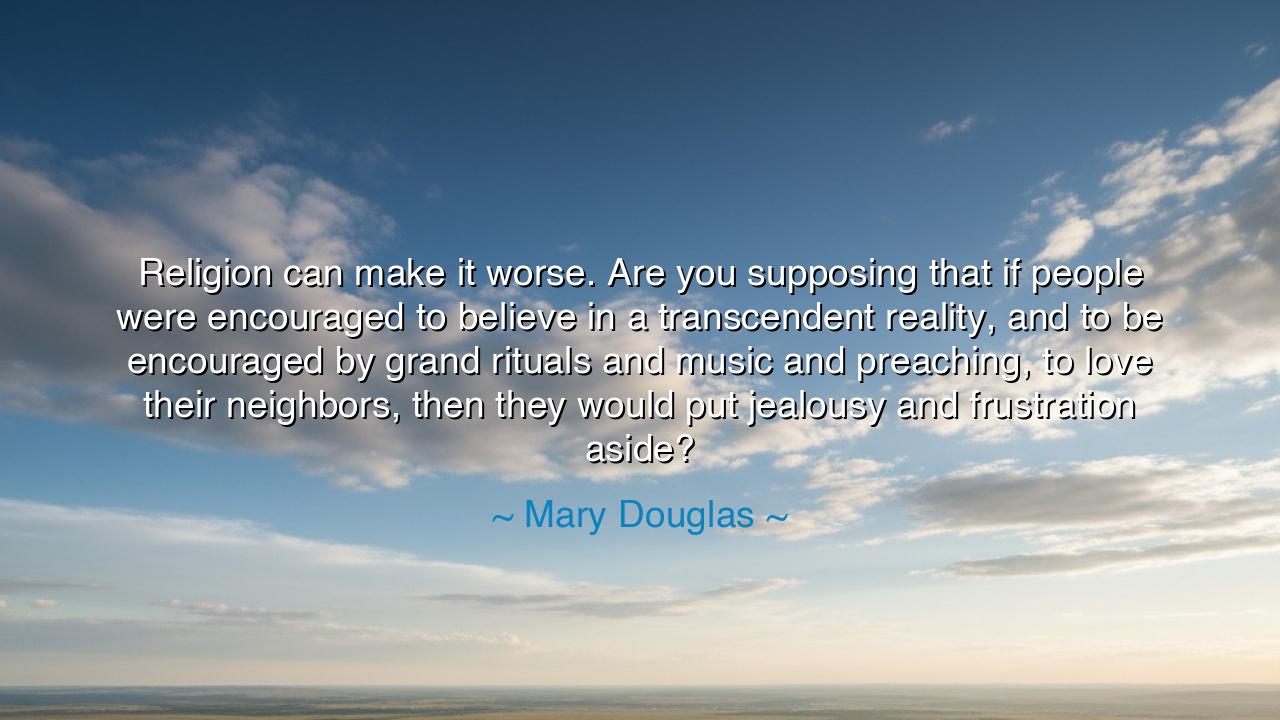
Religion can make it worse. Are you supposing that if people were
Religion can make it worse. Are you supposing that if people were encouraged to believe in a transcendent reality, and to be encouraged by grand rituals and music and preaching, to love their neighbors, then they would put jealousy and frustration aside?






In the discerning words of Mary Douglas, the great anthropologist of the twentieth century, there resounds a question as piercing as any oracle: “Religion can make it worse. Are you supposing that if people were encouraged to believe in a transcendent reality, and to be encouraged by grand rituals and music and preaching, to love their neighbors, then they would put jealousy and frustration aside?” In these lines, Douglas does not scorn faith — she examines it, weighing its power and its peril with the balance of truth. Her words shine like a mirror held before humanity, revealing both the glory and the weakness within the human heart. For she reminds us that belief alone does not heal jealousy, nor do rituals alone purge frustration. The temple may be filled with hymns, yet envy can still whisper in the worshipper’s soul.
To understand her meaning, we must first look to the origin of her thought. Mary Douglas was a scholar who studied the sacred not from the pulpit, but from the field — observing tribes, customs, and the complex architecture of human belief. Her insight was born not from cynicism, but from reverence tempered by realism. She saw that religion, in all its beauty, is a vessel shaped by human hands, and therefore carries the cracks of human nature within it. The faith that inspires compassion can also inflame pride; the ritual that unites can also exclude. When she says, “Religion can make it worse,” she is warning us that the same fire that warms the home can also burn it down.
The meaning of her question lies in its piercing irony. She asks whether belief in the transcendent — in a higher realm of purity and goodness — is enough to cure the base instincts of mankind. Her tone suggests she knows the answer: it is not. For while men and women may lift their voices in song and bow their heads in prayer, their hearts still wrestle with the same shadows that haunted Cain and Abel — jealousy, frustration, envy, and pride. These emotions are not banished by belief alone, for they are woven into the mortal condition. To suppose otherwise, Douglas implies, is to mistake ritual for transformation, and devotion for enlightenment.
History itself offers us endless proof of her insight. Consider the tale of the Crusades, when men marched under the banner of the cross — not to love their neighbors, but to conquer them. The same faith that preached peace was wielded as a sword of conquest. Or think of the schisms and inquisitions that tore through centuries, each side claiming divine favor while condemning the other. Religion, meant to unite souls in reverence, often became the battlefield of jealousy and fear — jealousy of other beliefs, fear of difference, and frustration at the limits of human understanding. The rituals were grand, the sermons eloquent, but the hearts of men remained unchanged. Douglas saw this and understood that no cathedral, no chant, no priestly robe could purify the heart that refuses to confront its own darkness.
Yet, her words are not a rejection of faith, but a call to deepen it. She challenges believers not to mistake the outer forms for the inner work. The transcendent reality she speaks of is not denied — but she warns that one cannot reach it by ceremony alone. To love one’s neighbor is not the work of a hymn, but of humility. To overcome jealousy and frustration, one must look inward, not upward; for the divine, though exalted, dwells within. The lesson is clear: true faith is not inherited through ritual, but forged through self-knowledge.
We can see this truth in the life of Francis of Assisi, who renounced his wealth, his privilege, and even the comfort of the church’s power to live among the poor. Though raised within the rituals of religion, he found his salvation not in its pageantry, but in its essence — compassion. When others sought glory, he sought service. When others clung to jealousy and rivalry, he laid them aside. Francis discovered what Mary Douglas so eloquently questioned: that the true transcendent reality is not found in the temple, but in the act of love itself.
The lesson, then, is both humbling and hopeful. Religion can inspire greatness, but only when it is lived, not performed. Let your rituals be reminders, not disguises. Let your songs and sermons drive you not toward pride, but toward kindness. When jealousy arises, confront it with self-awareness. When frustration burns, cool it with understanding. For the sacred is not merely in the sky above or in the scriptures we hold — it is in the daily labor of compassion, the quiet courage of forgiveness, the choice to love even when it costs us.
So, my listener, remember the wisdom of Mary Douglas. Do not expect that faith alone will cleanse your heart, nor that rituals will erase your envy. Religion may lift the spirit, but it is the work of the soul that purifies it. Worship, yes — but more importantly, awaken. For the divine you seek in temples is already within you, waiting not for song or sermon, but for honesty and love. Only then will the transcendent cease to be a dream beyond reach — it will become the living truth within your very being.






AAdministratorAdministrator
Welcome, honored guests. Please leave a comment, we will respond soon